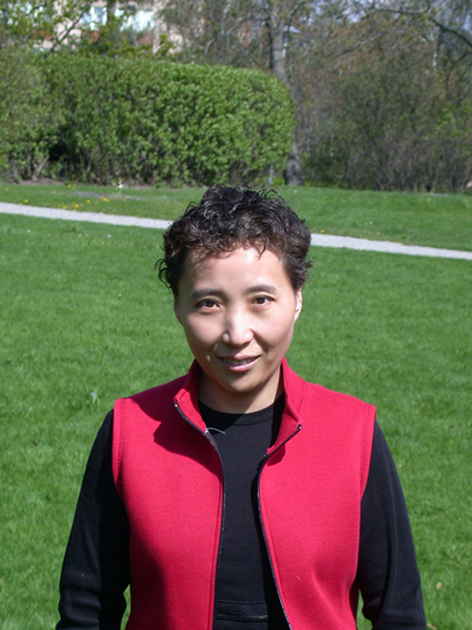General

Prof. Dr. Li Yuan
College of Life Sciences
Chinese Academy of Sciences
Email: yuanli@gucas.ac.cn
Telephone: +86 10 88256717
Address:19A Yu Quan Rd
Postcode: Beijing, 100049
College of Life Sciences
Chinese Academy of Sciences
Email: yuanli@gucas.ac.cn
Telephone: +86 10 88256717
Address:19A Yu Quan Rd
Postcode: Beijing, 100049
Education
2000 - Ph.D. in Natural Sciences, Molecular Genetics, Karolinska Institute, Stockholm, Sweden
Experience
Previous Positions
Principal Investigator, Position funded by the Swedish Research Council.
at the Department of Cell and Molecular Biology, Medical Nobel Institute, Sweden.
Principal Investigator, Position funded by the Swedish Research Council.
at the Department of Cell and Molecular Biology, Medical Nobel Institute, Sweden.
Publications
Selected Publications
Fang G, Zhang D, Yin H, Zheng L, Bi X, Yuan L.Centlein mediates an interaction between C-Nap1 and Cep68 to maintain centrosome cohesion.J Cell Sci 2014 127:1631-1639
Guan J, Kinoshita M and Yuan L*. Spatiotemporal association of DNAJB13 with the annulus during mouse sperm flagellum development. BMC Dev Biol. 2009 Mar 19;9(1):23. [Epub ahead of print]
Guan J, Ekwurtzel E, Kvist U and Yuan L*. Cohesin protein SMC1 is a centrosomal protein. Biochem Biophys Res Commun. 2008, 372:761-4.
Hoja MR, Liu JG, Mohammadieh M, Kvist U and Yuan L*.
E2F1 deficiency impairs murine spermatogenesis and augments testicular degeneration in SCP3-nullizygous mice.
Cell Death Differ. 2004; 11:354-356
Yuan L, Liu JG, Hoja MR, Wilbertz J, Nordqvist K, Hoog C. Female germ cell
aneuploidy and embryo death in mice lacking the meiosis-specific protein SCP3. Science. 2002; 296:1115-8
* correspondence
Fang G, Zhang D, Yin H, Zheng L, Bi X, Yuan L.Centlein mediates an interaction between C-Nap1 and Cep68 to maintain centrosome cohesion.J Cell Sci 2014 127:1631-1639
Guan J, Kinoshita M and Yuan L*. Spatiotemporal association of DNAJB13 with the annulus during mouse sperm flagellum development. BMC Dev Biol. 2009 Mar 19;9(1):23. [Epub ahead of print]
Guan J, Ekwurtzel E, Kvist U and Yuan L*. Cohesin protein SMC1 is a centrosomal protein. Biochem Biophys Res Commun. 2008, 372:761-4.
Hoja MR, Liu JG, Mohammadieh M, Kvist U and Yuan L*.
E2F1 deficiency impairs murine spermatogenesis and augments testicular degeneration in SCP3-nullizygous mice.
Cell Death Differ. 2004; 11:354-356
Yuan L, Liu JG, Hoja MR, Wilbertz J, Nordqvist K, Hoog C. Female germ cell
aneuploidy and embryo death in mice lacking the meiosis-specific protein SCP3. Science. 2002; 296:1115-8
* correspondence
Research Interests
Current Research Interest
Current research in my laboratory centers on characterization of a novel protein in centriole biogenesis and primary cilium formation with the aim to elucidate the relationship of the protein with other centriole- and cilium-associated proteins, which to this end may reveal the novel molecular mechanisms underlying centriole and ciliary biogenesis and functions.
The fundamental question behind our work is how the centrosome and primary cilium control cell function and influence development, and how defects in these structures cause a remarkable range of human disease. The centrosome is the microtubule-organising centre (MTOC) of the cell, and so it regulates cell motility, adhesion and polarity in interphase, and facilitates the organization of the spindle poles during mitosis. Abnormalities in the spindle-pole-organization function occur in many cancers because extra and often irregular centrosomes can give rise to aberrant cell division. In addition, the core centrosomal components, the centrioles, have another distinct function as basal bodies that seed the growth of cilia. Cells in G0 and G1 usually contain one centrosome consisting of two centrioles, termed the mother centriole and the daughter centriole. The mother or older centriole is characterized by the presence of appendages that are formed during cell cycle progression. Moreover, when cells escape the cell cycle the mother centriole eventually give rise to the basal body that outgrows a primary cilium. Disturbances of primary cilia underly a lot of human diseases, e.g. kidney diseases, left-right axes formation and hydrocephalus.
Current research in my laboratory centers on characterization of a novel protein in centriole biogenesis and primary cilium formation with the aim to elucidate the relationship of the protein with other centriole- and cilium-associated proteins, which to this end may reveal the novel molecular mechanisms underlying centriole and ciliary biogenesis and functions.
The fundamental question behind our work is how the centrosome and primary cilium control cell function and influence development, and how defects in these structures cause a remarkable range of human disease. The centrosome is the microtubule-organising centre (MTOC) of the cell, and so it regulates cell motility, adhesion and polarity in interphase, and facilitates the organization of the spindle poles during mitosis. Abnormalities in the spindle-pole-organization function occur in many cancers because extra and often irregular centrosomes can give rise to aberrant cell division. In addition, the core centrosomal components, the centrioles, have another distinct function as basal bodies that seed the growth of cilia. Cells in G0 and G1 usually contain one centrosome consisting of two centrioles, termed the mother centriole and the daughter centriole. The mother or older centriole is characterized by the presence of appendages that are formed during cell cycle progression. Moreover, when cells escape the cell cycle the mother centriole eventually give rise to the basal body that outgrows a primary cilium. Disturbances of primary cilia underly a lot of human diseases, e.g. kidney diseases, left-right axes formation and hydrocephalus.
Students
现指导学生
房国梁 博士研究生 071007-遗传学
来庆璇 博士研究生 071007-遗传学
张大川 博士研究生 071007-遗传学
高璇 博士研究生 071007-遗传学
景珍丽 硕士研究生 071007-遗传学
尹会龙 博士研究生 071007-遗传学
汪俊彦 硕士研究生 085238-生物工程
郑璐 博士研究生 071010-生物化学与分子生物学
孔令军 硕士研究生 071010-生物化学与分子生物学
